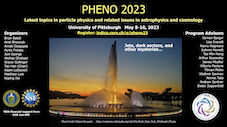Speaker
Description
In my talk, I will present recent significant work on the formation of primordial black hole dark matter and the resultant
gravitational wave signal, drawing from the results of arXiv:2303.02168, with co-authors
W. Qin, S. Balaji, D.I. Kaiser, and E. McDonough, which has been submitted for peer review to Phys. Rev. D. My talk will also build on our previous results as published in (Phys.
Rev.D 106, 063535 (2022), arXiv:2205.04471). In our work, we performed a Markov Chain Monte Carlo (MCMC)
analysis of a simple yet generic multifield inflation model characterized by two scalar fields coupled to each
other and nonminimally coupled to gravity, fit to Planck 2018 cosmic microwave background (CMB) data. In
particular, model parameters are constrained by data on the amplitude of the primordial power spectrum of
scalar curvature perturbations on CMB scales As, the spectral index ns, and the ratio of power in tensor to
scalar modes r, with a prior that the primordial power spectrum should also lead to primordial black hole
(PBH) production sufficient to account for the observed dark matter (DM) abundance.
I will demonstrate that ns in particular largely controls the constraints on our class of models. Whereas
previous studies of PBH formation from an ultra-slow-roll phase of inflation have highlighted the need for at
least one model parameter to be highly fine-tuned, I will identify a degeneracy direction in parameter space
such that shifts by ∼ 10% of one parameter can be compensated by comparable shifts in other parameters
while preserving a close fit between model predictions and observations. Furthermore, I will show how this
allowed parameter region produces observable gravitational wave (GW) signals in the frequency ranges to
which upcoming experiments are projected to be sensitive, including Advanced LIGO and Virgo, the Einstein
Telescope (ET), DECIGO, and LISA.
